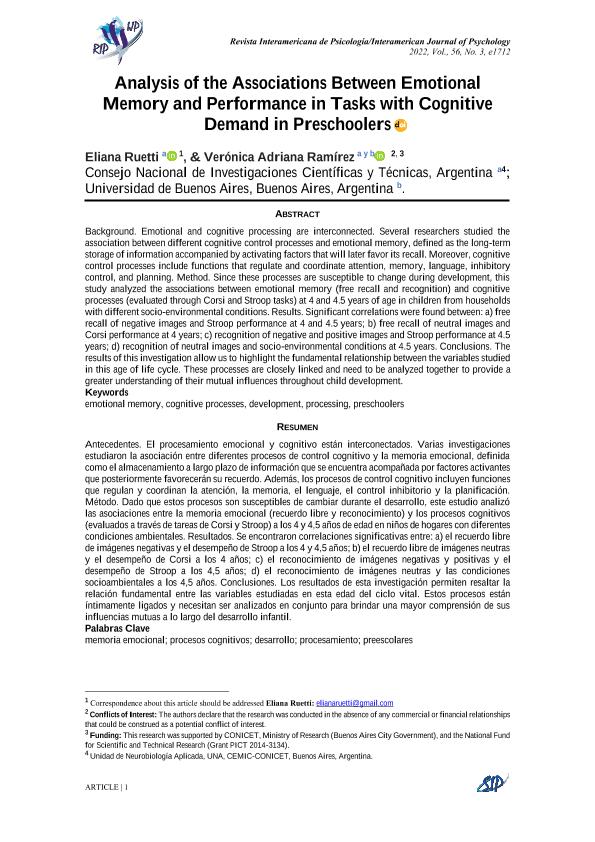Artículo
Background. Emotional and cognitive processing are interconnected. Several researchers studied the association between different cognitive control processes and emotional memory, defined as the long-term storage of information accompanied by activating factors that will later favor its recall. Moreover, cognitive control processes include functions that regulate and coordinate attention, memory, language, inhibitory control, and planning. Method. Since these processes are susceptible to change during development, this study analyzed the associations between emotional memory (free recall and recognition) and cognitive processes (evaluated through Corsi and Stroop tasks) at 4 and 4.5 years of age in children from households with different socio-environmental conditions. Results. Significant correlations were found between: a) free recall of negative images and Stroop performance at 4 and 4.5 years; b) free recall of neutral images and Corsi performance at 4 years; c) recognition of negative and positive images and Stroop performance at 4.5 years; d) recognition of neutral images and socio-environmental conditions at 4.5 years. Conclusions. The results of this investigation allow us to highlight the fundamental relationship between the variables studied in this age of life cycle. These processes are closely linked and need to be analyzed together to provide a greater understanding of their mutual influences throughout child development. Antecedentes. El procesamiento emocional y cognitivo están interconectados. Varias investigaciones estudiaron la asociación entre diferentes procesos de control cognitivo y la memoria emocional, definida como el almacenamiento a largo plazo de información que se encuentra acompañada por factores activantes que posteriormente favorecerán su recuerdo. Además, los procesos de control cognitivo incluyen funciones que regulan y coordinan la atención, la memoria, el lenguaje, el control inhibitorio y la planificación. Método. Dado que estos procesos son susceptibles de cambiar durante el desarrollo, este estudio analizó las asociaciones entre la memoria emocional (recuerdo libre y reconocimiento) y los procesos cognitivos (evaluados a través de tareas de Corsi y Stroop) a los 4 y 4,5 años de edad en niños de hogares con diferentes condiciones ambientales. Resultados. Se encontraron correlaciones significativas entre: a) el recuerdo libre de imágenes negativas y el desempeño de Stroop a los 4 y 4,5 años; b) el recuerdo libre de imágenes neutras y el desempeño de Corsi a los 4 años; c) el reconocimiento de imágenes negativas y positivas y el desempeño de Stroop a los 4,5 años; d) el reconocimiento de imágenes neutras y las condiciones socioambientales a los 4,5 años. Conclusiones. Los resultados de esta investigación permiten resaltar la relación fundamental entre las variables estudiadas en esta edad del ciclo vital. Estos procesos están íntimamente ligados y necesitan ser analizados en conjunto para brindar una mayor comprensión de sus influencias mutuas a lo largo del desarrollo infantil.
Analysis of the Associations Between Emotional Memory and Performance in Tasks with Cognitive Demand in Preschoolers
Fecha de publicación:
12/2022
Editorial:
Interamerican Society of Psychology
Revista:
Revista Interamericana de Psicología
ISSN:
0034-9690
Idioma:
Inglés
Tipo de recurso:
Artículo publicado
Clasificación temática:
Resumen
Palabras clave:
COGNITIVE PROCESSES
,
DEVELOPMENT
,
EMOTIONAL MEMORY
,
PRESCHOOLERS
,
PROCESSING
Archivos asociados
Licencia
Identificadores
Colecciones
Articulos(CEMIC-CONICET)
Articulos de CENTRO DE EDUCACION MEDICA E INVESTIGACIONES CLINICAS "NORBERTO QUIRNO"
Articulos de CENTRO DE EDUCACION MEDICA E INVESTIGACIONES CLINICAS "NORBERTO QUIRNO"
Citación
Ruetti, Eliana Martha; Ramírez, Verónica Adriana; Analysis of the Associations Between Emotional Memory and Performance in Tasks with Cognitive Demand in Preschoolers; Interamerican Society of Psychology; Revista Interamericana de Psicología; 56; 3; 12-2022; 1-26
Compartir
Altmétricas




